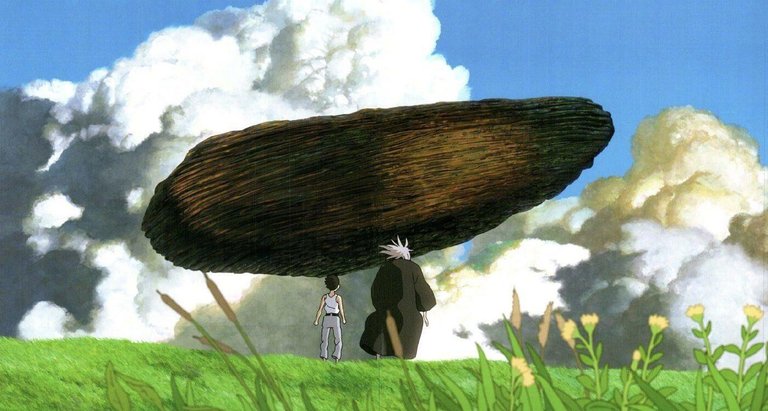
Heading towards the Academy Awards, which are just over a month away, I still have to see many of the nominated films, but I will try to review all (or most) of them to share my impressions here. One of the categories in which I hadn't seen any of the nominees was Best Animated Feature Film, so taking advantage of the fact that they were showing this film in a theater close to home, I went to see it yesterday afternoon.
Rumbo a los premios de la Academia, que están a poco más de un mes, aún me falta ver muchas de las películas nominadas, pero intentaré revisarlas todas (o la mayoría) para compartir mis impresiones por acá. Una de las categorías en las que no había visto ninguna de las nominadas era la de Mejor Largometraje de Animación, así que aprovechando que estaban pasando este film en un cine cercano a casa, fui a verlo ayer por la tarde.
Hayao Miyazaki needs no introduction: the film director and founder of Ghibli studios is the father of some of the best animated films that have been made in recent decades and just as there are millions of children who grew up with Pixar, many others grew up hand in hand with My Neighbor Totoro, Ponyo, Princess Mononoke, the impressive Howl's Moving Castle and the classic Spirited Away that earned Miyazaki his first and only Oscar to date (not counting one for his career), just in the category in which he competes this time with Kimitachi wa dô ikiru kaaka (The Boy and the Heron) a film that, although it has the title of a Japanese novel, is not based on that story. Miyazaki himself has confessed that this is his most personal film - which I don't know because I don't know his biography - and it has also been said that it is his most metaphorical and symbolic film and - despite not having seen all of his films - Yes I agree with that statement. Like so many other stories, this is a story of initiation, of that passage from childhood to adolescence, and also of a journey through a magical world in which strange creatures and peculiar characters appear. There are echoes of Spirited Away, of the myth of Orpheus, and of something that we could call Japanese mythology because there is the presence of symbols common to many of its legends and cultural references: animals, portals, wise men, etc.
Hayao Miyazaki no necesita presentación: el director de cine y fundador de estudios Ghibli es el padre de algunas de las mejores películas animadas que se han hecho en las últimas décadas y así como hay millones de niños que crecieron de la mano de Pixar, muchos otros crecieron de la mano de Mi vecino Totoro, Ponyo, La princesa Mononoke, la impresionante El castillo ambulante y la clásica El viaje de Chihiro que le valió a Miyazaki su primer y único Oscar hasta la fecha (sin contar uno por su trayectoria), justo en la categoría en la que compite en esta oportunidad con Kimitachi wa dô ikiru kaaka (The Boy and the Heron) una película que si bien tiene el título de una novela japonesa, no está basada en esa historia. El propio Miyazaki ha confesado que esta es su película más personal - lo que no me consta porque no conozco su biografía - y también se ha dicho que es su película más metafórica y más simbólica y - a pesar de no haber visto todas sus películas - sí estoy de acuerdo con esa afirmación. Como tantas otras historias, esta es una historia de iniciación, de ese paso de la niñez a la adolescencia, y también de un viaje a través de un mundo mágico en el que aparecen criaturas extrañas y personajes peculiares. Hay ecos de El viaje de Chihiro, del mito de Orfeo, y de algo que podríamos llamar mitología japonesa porque hay presencia de símbolos comunes a muchas de sus leyendas y referencias culturales: animales, portales, sabios, etc.
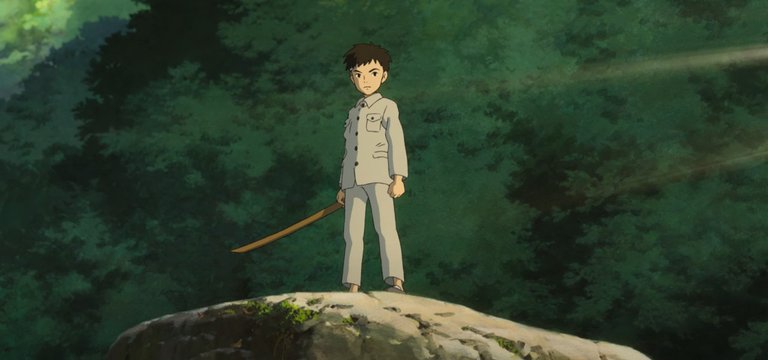
The film begins with the story of Mahito, a boy between ten and twelve years old whose mother dies in a fire during the Pacific War. A little to overcome that situation and go through the grief, he and his father move to another city to live with the mother's sister (who is pregnant and physically looks a lot like her) and with a peculiar group of servants whose head are seven short old women (Snow White?).
La película inicia con la historia de Mahito, un niño de entre diez y doce años cuya madre muere en un incendio durante la guerra del Pacífico. Un poco para superar esa situación y atravesar el duelo, su padre y él se trasladan a otra ciudad para vivir junto a la hermana de la madre (que está embarazada y físicamente se parece mucho a ella) y con un grupo peculiar de sirvientes a cuya cabeza se encuentran siete ancianas de baja estatura (¿Blancanieves?).
Barely arriving there, in the midst of pain for the loss of his mother and nightmares in which he sees her consumed by flames, and a difficult and unsuccessful adaptation to his new school, Mahito - through an encounter with a heron that seems talk to him - discovers a mysterious tower on the grounds of the house that - according to his aunt - was built by his great-uncle, but which appears to be something more than that. From there, Mahito begins a confusing relationship with the heron, is a friend? an enemy? Does it want to help him or set him up? and he meets different characters and goes through different universes. There are gates, beaches, islands, many birds, strange creatures, giant fish, and mysterious forces, energies that seem to represent good and evil, light and darkness, the real world and the afterlife, or at least a different plane to ours, which may represent an afterlife or an instance prior to this world. All these creatures, their colors, their presence in that universe, have some kind of meaning, but I think that the metaphors and symbols used by Miyazaki are not fully understood. Something similar happened to me with certain elements of Spirited Away, but unlike that other film, in The Boy and the Heron it seemed to me that the story rambles a little more, like it is a trip that doesn't have a destiny, a specific mission (although it seems to be announced at some point, there are certain things that do not flow in that direction).
Apenas llegar allí, en medio del dolor por la pérdida de su madre y las pesadillas en las que la ve consumirse por las llamas, y una difícil e infructuosa adaptación a su nueva escuela, Mahito - por medio de un encuentro con una garza que parece hablarle - descubre una misteriosa torre en el terreno de la casa que - según su tía - fue construida por su tío abuelo, pero que parece ser algo más que eso. A partir de allí, Mahito inicia una relación confusa con la garza, ¿es su amigo? ¿su enemigo? ¿quiere ayudarlo o tenderle una trampa? y va conociendo diferentes personajes y atravesando diferentes universos. Hay puertas, playas, islas, muchas aves, criaturas extrañas, peces gigantes, y fuerzas misteriosas, energías que parecen representar el bien y el mal, la luz y la oscuridad, el mundo real y el más allá, o al menos un plano diferente al nuestro que puede representar un afterlife o una instancia previa a este mundo. Todas estas criaturas, sus colores, su presencia en ese universo, tienen algún tipo de significado, pero creo que las metáforas y los símbolos empleados por Miyazaki no se entienden del todo. Algo similar me pasó con ciertos elementos de El viaje de Chihiro, pero a diferencia de esa otra película, en The Boy and the Heron me pareció que la historia divaga un poco más, como que es un viaje que no tiene un destino, una misión concreta (aunque parezca anunciarse en algún momento, hay ciertas cosas que no fluyen en esa dirección).
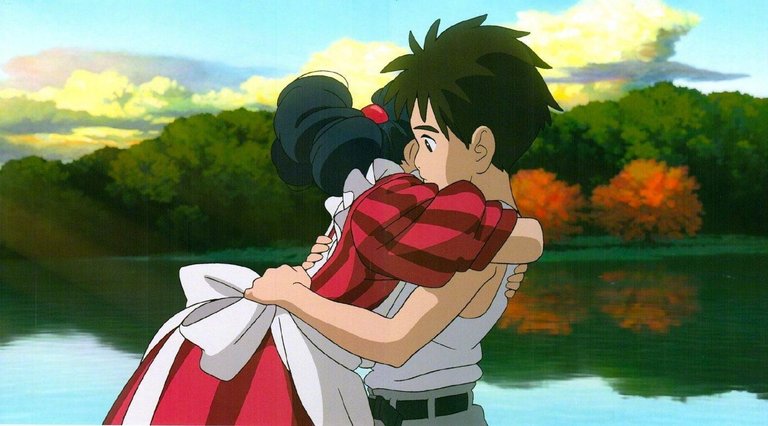
The animation of the film is spectacular, the production design (which I don't know what it is called in the case of animated films) is very good; and, of course, it's about Miyazaki and Ghibli, they have nothing to prove, they have done great things, but I think The Boy and the Heron is more of the same with a slightly lower level than other works of his. To compare it with another recent reference, I think Suzume by Makoto Shinkai has a better script, a story that has a beginning, development, climax and outcome and that always maintains a common thread around which the characters and actions are connected. In it there is nothing extra, fortuitous, or that has no reason to be there (and the animation is also incredible), which I do believe happens in this work by Miyazaki. The most fans of the Japanese director and his studio will surely enjoy this film, but I don't know if it is recommended for everyone, or for very young children (here in Chile children from 7 years old can see it, but at that age I don't think they can understand or enjoy it). Now, it is clear that the opinion of the majority is different, the film has raised a good sum of money, and has already won the Golden Globe in the same category in which it competes at the Oscars against Spider-Man: Across the Spider -Verse, Nimona, Elemental and Robot Dreams, none of which I have seen, but which catch my attention, especially the last one, have any of you seen The Boy and the Heron? what did you think? I read you in the comments.
La animación de la película es espectacular, el diseño de produción (que no sé cómo se llama en el caso de las películas animadas) es muy bueno; y es que, claro, se trata de Miyazaki y de Ghibli, no tienen nada que demostrar, han hecho cosas grandiosas, pero creo que The Boy and the Heron es más de lo mismo con un nivel ligeramente inferior a otros trabajos suyos. Por compararlo con otro referente reciente, creo que Suzume de Makoto Shinkai tiene un mejor guión, una historia que tiene inicio, desarrollo, clímax y desenlace y que mantiene siempre un hilo conductor alrededor del cual los personajes y las acciones se conectan. En ella no hay nada extra, fortuito, o que no tenga un motivo para estar allí (y la animación también es increíble), cosa que sí creo que pasa en este trabajo de Miyazaki. Los más fanáticos del director japonés y de su estudio seguramente disfrutarán esta película, pero no sé si sea recomendable para todo el mundo, o para niños muy pequeños (acá en Chile la pueden ver niños a partir de los 7 años, pero a esa edad no creo que la puedan entender ni disfrutar). Ahora bien, queda claro que la opinión de la mayoría es diferente, la película ha recaudado una buena suma de dinero, y ya obtuvo el Globo de Oro en la misma categoría en la que compite en los Oscars contra Spider-Man: Across the Spider-Verse, Nimona, Elemental y Robot Dreams, ninguna de las cuales he visto, pero que me llaman la atención, sobre todo la última, ¿alguno de ustedes ya vio The Boy and the Heron? ¿qué les pareció? Los leo en los comentarios.

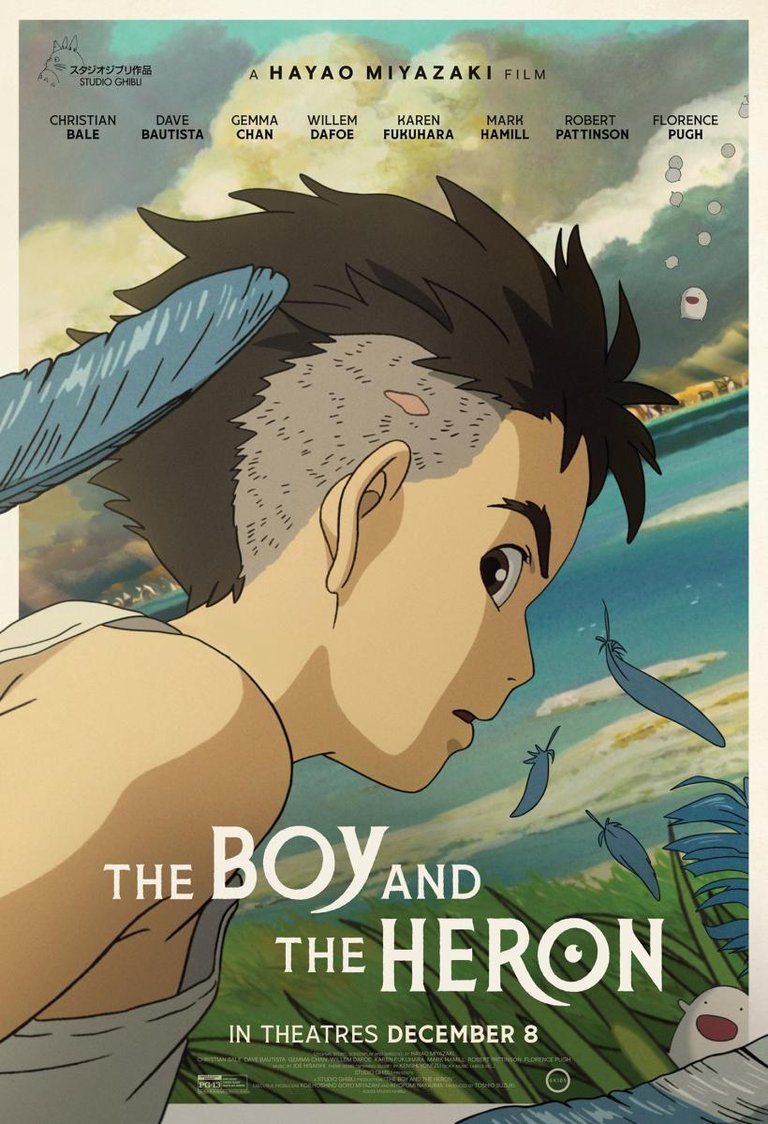
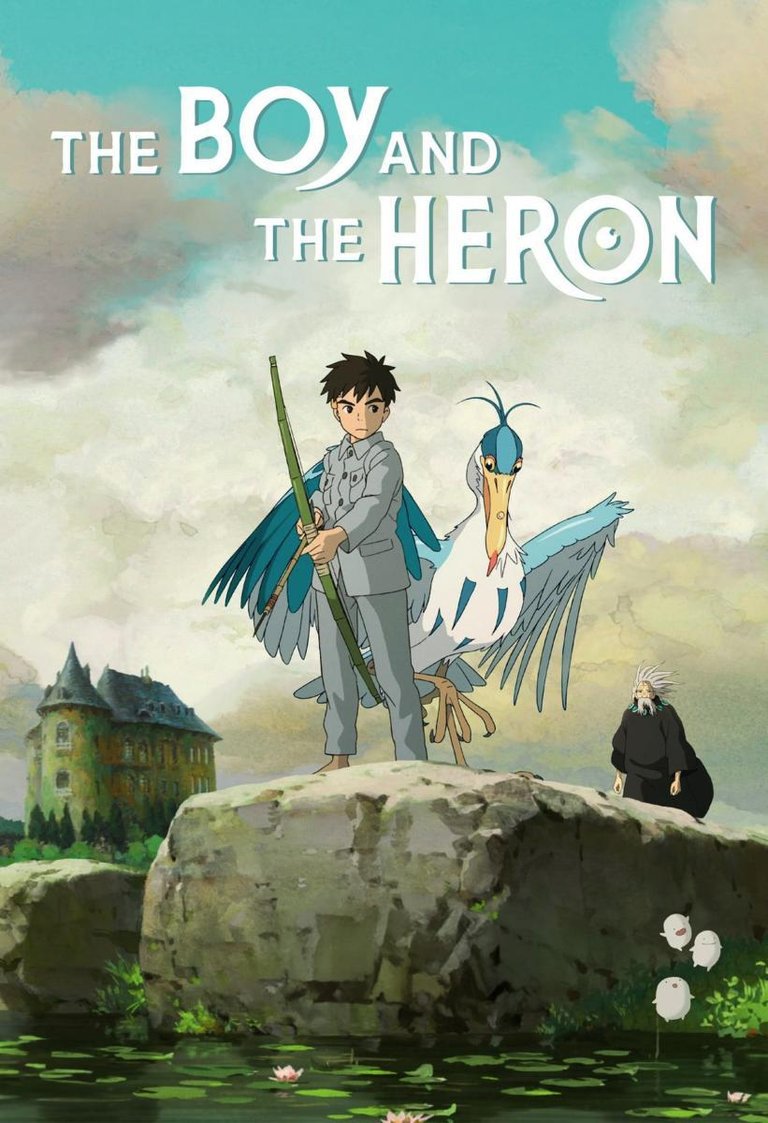
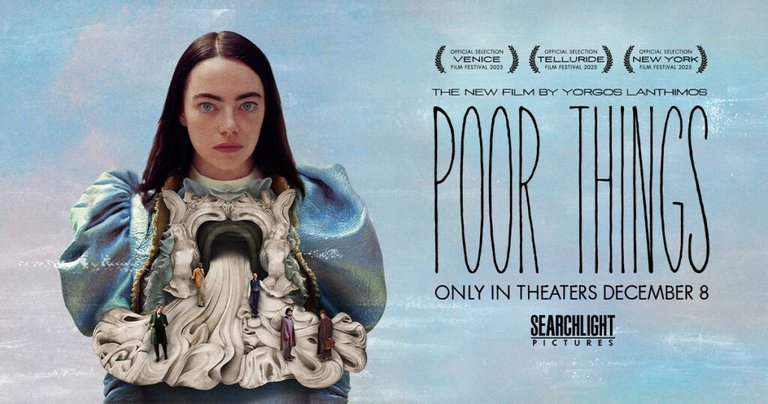
Congratulations @cristiancaicedo! You have completed the following achievement on the Hive blockchain And have been rewarded with New badge(s)
Your next target is to reach 180000 upvotes.
You can view your badges on your board and compare yourself to others in the Ranking
If you no longer want to receive notifications, reply to this comment with the word
STOPCheck out our last posts:
I really wanted to see this in the cinema but I just can't find it in its original audio. :(
Too bad. I hope you can see it soon that way.
Yo estoy en esa etapa de descubrimiento de las películas del estudio Ghibli, todavía me faltan varias por ver, pero las que he visto me han gustado bastante. No he tenido la oportunidad de echarle un vistazo a su última producción, ni siquiera sé qué esperar, pero cómo comentas, la animación debe ser increíble viniendo de él. Sin duda la opinión de todos es diferente, espero verla pronto y poder expresar mi opinión al respecto también 🤩. Saludos!
Espero que la puedas ver pronto. Yo tampoco he visto todo Ghibli, pero mi favorita hasta ahora sigue siendo La tumba de las luciérnagas.
Hayao Miyazaki is an Asian animation genius. It's great to see him come out of retirement and treat us to another great movie.
Soon, I will be able to watch it too. Then, I will write my review and publish it.
Thanks for this great review, @cristiancaicedo.
I'll be glad to read your review. Thank you so much for your support.
No he tenido la oportunidad de verla, pero la tengo en la lista. Me sorprende un poco que no tenga la misma calidad que otras producciones a pesar de su gran relevancia. La trama o argumento se siente lo suficiente atractivo para mí.
Igual y se trata de una valoración personal. Seguramente otras personas pensarán de forma diferente respecto a la película. Saludos y gracias por leerme.